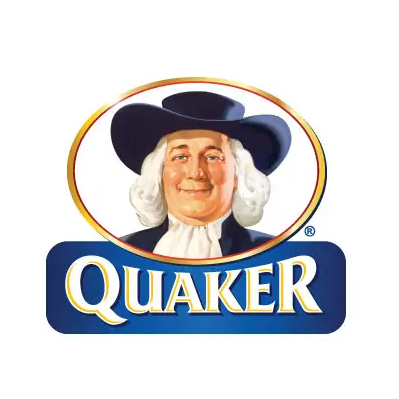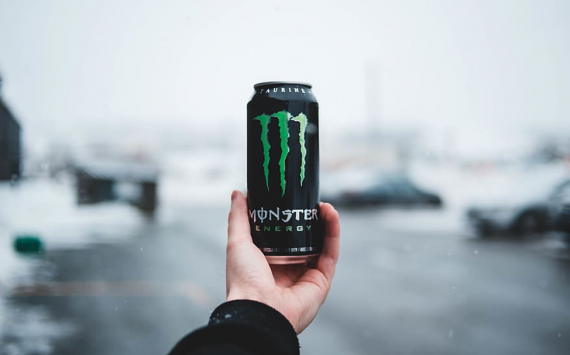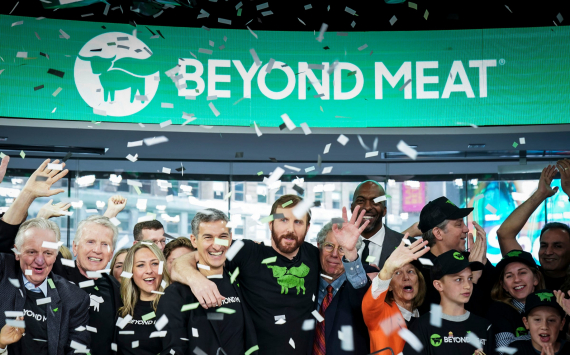Description
The Quaker Oats Company, known as Quaker, is an American food conglomerate based in Chicago. It has been owned by PepsiCo since 2001.
History
Precursor miller companies
In the 1850s, Ferdinand Schumacher and Robert Stuart founded oat mills. Schumacher founded the German Mills American Oatmeal Company in Akron, Ohio, and Stuart founded the North Star Mills in Ontario, Canada. In 1870, Schumacher ran his first known cereal advertisement in the Akron Beacon Journal newspaper. In 1877, the Quaker Mill Company of Ravenna, Ohio was founded. "The name was chosen when Quaker Mill partner Henry Seymour found an encyclopedia article on Quakers and decided that the qualities described — integrity, honesty, purity — provided an appropriate identity for the company's oat product." Quaker Mill Company held the trademark on the Quaker name. In Ravenna, Ohio, on 4 September 1877, Henry Seymour of the Quaker Mill Company applied for the first trademark for a breakfast cereal, "a man in 'Quaker garb'".
In 1879, John Stuart and his son Robert joined with George Douglas to form Imperial Mill and set up their operation in Chicago, Illinois. In 1881, Henry Crowell bought the Quaker Mill Company, and the following year he launched a national advertising campaign for Quaker Oats, introducing a cereal box that made it possible to buy in quantities other than bulk. He also bought the bankrupt Quaker Oat Mill Company in Ravenna, and held the key positions of general manager, president and chairman of the company from 1888 until late 1943, becoming known as the cereal tycoon. He donated more than 70% of his wealth to the Crowell Trust.
In 1888, the American Cereal Company was formed by the merger of seven major oat millers. Ferdinand Schumacher became president, Henry Crowell, general manager and John Stuart the secretary treasurer. In 1889, the American Cereal Company introduced the half ounce trial size and, as a promotion, they distributed one to every home in Portland, Oregon via boys on bicycles. Later, this promotion was extended to other cities. A second promotion involved placing dinner plates within the then-regular (not round) boxes of oats.
Quaker Oats Company
In 1901, the Quaker Oats Company was founded in New Jersey with headquarters in Chicago, by the merger of four oat mills: the Quaker Mill Company in Ravenna, Ohio, which held the trademark on the Quaker name; the cereal mill in Cedar Rapids, Iowa owned by John Stuart, his son Robert Stuart, and their partner George Douglas; the German Mills American Oatmeal Company in Akron, Ohio, owned by Schumacher; The Rob Lewis & Co. American Oats and Barley Oatmeal Corporation. Formally known as "Good For Breakfast" instant oatmeal mix. In the same year, the whole merged company was acquired by Henry Parsons Crowell, who also bought the bankrupt Quaker Oat Mill Company, also in Ravenna. Crowell held the positions of general manager, president and chairman of the company until late 1943. He became known as the cereal tycoon. He donated more than 70% of his wealth to the Crowell Trust.
In 1908, Quaker Oats introduced the first in a series of cookie recipes on the box. In 1911, Quaker Oats purchased the Great Western Cereal Company. The iconic cylindrical package made its first appearance in 1915. Later that year, Quaker offered the first cereal box premium to buyers. By sending in one dollar and the cut out picture of the "Quaker Man" customers received a double boiler for the cooking of oatmeal.
In the 1920s, Quaker introduced "Quaker Quick Oats" an early convenience food and also offered a crystal radio kit using the cylindrical package. In the 1930s, Quaker was one of the many companies using the Dionne Quintuplets for promotional purposes. Quaker Oats in Cedar Rapids, Iowa, was photographed during the 1930s by Theodor Horydczak, who documented the building, operations, and factory workers at the plant.
During World War II, the company, through its subsidiary the Q. O. Ordnance Company, operated the Cornhusker Ordnance Plant (six miles west of Grand Island) as a government-owned, contractor-operated 11,960-acre site. Construction began in March 1942 and production ended on 15 August 1945. It manufactured millions of pieces of various artillery munitions (41 warehouses and 219 magazines of total 280,800 ft² were built).
In 1946, artist Jim Nash was commissioned to produce a head portrait of the Quaker Man, which became the basis for Haddon Sundblom's famous version of 1957. In 1972, John Mills designed the current logo.
From 1946 to 1953, researchers from Quaker Oats, MIT and Harvard University carried out experiments at the Walter E. Fernald State School to determine how the minerals from cereals were metabolized. Parents of mentally challenged children were asked for permission to let their children be members of a Science Club and participate in research. Being a member of the Science Club gave the children special privileges. The parents were told that the children would be fed with a diet high in nutrients. However, they were not told (and the consent form contained no information indicating) that the food their children were fed contained radioactive calcium and iron. The information obtained from the experiments was to be used as part of an advertising campaign. The company was later sued because of the experiments. The lawsuit was settled on 31 December 1997.
In 1968, a plant was built in Danville, Illinois, which now makes Aunt Jemima pancake mixes, Oat Squares, Life Cereals Quaker Oh's, Bumpers, Quisp, King Vitamin Natural Granola Cereals, and Chewy granola bars, as well as Puffed Rice for use as an ingredient for other products in other plants.
In 1969, Quaker acquired Fisher-Price, a toy company. In the 1970s, the company financed the making of the film Willy Wonka & the Chocolate Factory, in return obtaining a license to use a number of the product names mentioned in the movie for candy bars. In 1991, Quaker Oats spun off its Fisher-Price division.
In 1982, Quaker Oats purchased US Games, a company that created games for the Atari 2600. It went out of business after one year. That same year, Quaker Oats acquired Florida-based orange juice plant Ardmore Farms, which it would own until selling it to Country Pure Foods in 1998.
In 1983, Quaker bought Stokely-Van Camp, Inc., makers of Van Camp's and Gatorade.
Quaker bought Snapple for $1.7 billion in 1994 and sold it to Triarc in 1997 for $300 million. Triarc sold it to Cadbury Schweppes for $1.45 billion in September 2000. It was spun off in May 2008 to its current owners, Dr Pepper Snapple Group.
In 1996, Quaker spun off its frozen food business, selling it to Aurora Foods (which was bought by Pinnacle Foods in 2004).
In August 2001, PepsiCo acquired Quaker Oats for $14 billion, primarily for its Gatorade brand of soft drink. The merger created the fourth-largest consumer goods company in the world. Though the main prize of PepsiCo was Gatorade non-carbonated sports drink, Quaker's cereal and snack food division complemented the existing Frito-Lay salty-snacks division.
Since the late 1980s, actor Wilford Brimley has appeared in television commercials extolling the virtues of oat consumption, typically to a young child, as to introduce the concept of oatmeal consumption as a long tradition. In the 1990s Nickelodeon animated children's show Rugrats, the biggest fear of one of the characters, Chuckie Finster (the "scaredy-cat" of the bunch), was "the man on the oatmeal box". In Rugrats in Paris: The Movie, Chuckie overcame this fear when he became "Chuckie Chan". The song lyrics to his transformation included the line "He can stare into the eye/of the oatmeal guy!"

























